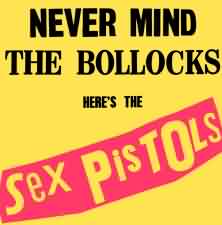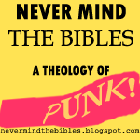Never mind the FAQs: Here's a bunch of questions and answers
Never Mind, the FAQs!
A list of questions nobody's ever asked and answers I might or might not give:
Why a book about punk rock and Christianity?
There's been a bunch of stuff written about punk rock over the years. In fact, it's probably the most written about genre of rock-and-roll ever. But you won't find much written about the spirituality of punk, especially from a Christian perspective. So I thought that was a niche I could fill with this book.
What's this book about, anyway?
It's sort of a memoir about my experience as small-town Midwestern teen who came of age during the era of punk rock, then got saved, became a fervent evangelical Christian and got rid of all my rock-and-roll records (because they were evil, you know), then later decided to take a more rational approach and try to figure out a way to reconcile my Christian faith with my love of punk rock.
Can one be a Christian and still listen to punk rock?
I like to think so.
How would you respond to Christians and Christian ministries that claim punk rock and other forms of rock music are harmful to the spirit, or even demonic?
I've heard about such claims. I've read some of them, but I don't think they hold much water. I don't want to get into a theological debate here, because that isn't the purpose of this site. Plenty of other venues exist on the Internet for those kinds of discussion.
But from my perspective, much of the controversy boils down to interpretation of the Bible, the way we see the world, and how we see our role in culture and subculture. I've heard and read that some Christians believe that the driving beat, loud noise and primal screaming of punk rock is harmful to the soul, or even demonic. To those who believe, I say, stay away from the music that offends you. Personally, I believe that punk rock -- like all other forms of music -- has ceretain redeeming qualities, and that the message of punk rock is relevant to our world today, and to our churches.
You're not trying to claim that all of punk rock is spiritual, are you?
Not at all. But many punk tunes address spiritual issues.
Such as...?
Issues such as identity ("Identity" and "I Am A Cliche," by X-Ray Spex), our search for meaning and spiritual significance ("We're Desperate," by X, "Blank Generation," by Richard Hell and the Voidoids), the depravity of humanity ("Anarchy in the UK" and "Pretty Vacant," both by the Sex Pistols), free will ("Freedom of Choice," by Devo) and critiques on materialism ("Complete Control," "Lost in a Supermarket" and "Koka Kola," all by the Clash, and X-Ray Spex's "Oh Bondage, Up Yours"). Those are just a few of many popular punk songs that address some of the same issues the Bible talks about.
So, what is punk rock, anyway?
I don't think any two punks will ever agree on a pure definition of punk rock. The Wikipedia definition describes punk rock as having certain attributes: an aggressive sound, simple chord structures, tunes that clock in at under 3 minutes. Those are pretty broad characterizations, but they probably fit many of the punk sounds. These days, punk rock has split into dozens of sub-genres: art rock, hardcore, noise, new wave, no wave, postpunk, emo, indie, goth, metalcore, etc. But "punk" is more than "punk rock." Punk rock is a musical style, while punk is more of a lifestyle.
OK. So what is punk, then?
I like the way Greg Graffin of Bad Religion defines punk in his Punk Manifesto. "Punk is: the personal expression of uniqueness that comes from the experiences of growing up in touch with our human ability to reason and ask questions." But that's just the money quote from his essay. If you want a better understanding of what punk is, you should read Graffin's entire essay. It's the best definition I've seen.
Is Green Day punk?
Sure.
Where did the name Never Mind the Bibles come from?
It's a play on the title of the Sex Pistols' seminal punk album, Never Mind the Bollocks.
I see. You also borrowed heavily from the album art, didn't you?
It's that obvious, eh?


Hey, I'm the one asking the questions, not you. (But, yes, it is that obvious.)
OK.
What qualifies you to write this book?
A lot of people would say, "Nothing." I've never been part of a "scene." I've never sported a mohawk. I have no tattoos or body piercings. But I'm as qualified as any blogger. I just like the music, the spirit, and I can decently and sometimes cogently string together words into complete sentences.
Why did you turn this into a blog instead of a traditional book?
A couple of years ago, I started writing what I thought would be a book about punk spirituality. After fine-tuning the introduction and chapters 1 and 2, I wrote a book proposal and shared customized versions of it with half a dozen or so Christian publishers. I also sent query letters to 20 or so other publishers, who wrote back to say, "Thanks, but no thanks." The publishers who received the proposal and draft chapters all rejected it. Although one publisher came this close to offering me a deal. But all of them thought this book idea was just not mainstream enough to be marketable.
Anyway, I put the writing on hold for awhile, but over the past few months I've been feeling an urgency to offer this book online. So that's why I created this blog.
With a blog format, readers can interact with me more as I go through the writing process. They can offer their critiques, share their ideas, share their rants, and generally interact with me if they want to.
Are you ever going to finish this book?
That's the plan. I hope to complete it by mid-2007, to coincide with the 30-year celebration of the Year of Punk.
So what happens after you finish the book?
I'll offer it here as a PDF.
Why don't you self-publish instead of blogging?
Because I like the idea of blogging. Plus, self-publishing, which inexpensive, still costs more money than blogging does.
If a publisher reads your blog and wants to offer you a real book deal, would you consider it?
Hell yeah.
How would the publisher get in touch with you?
By email: andrew DOT careaga AT gmail DOT com.
Have you written any other books?
Yes, I have written three: E-vangelism: Sharing the Gospel in Cyberspace, eMinistry: Connecting with the Net Generation, and Hooked on the Net: How to Say 'Goodnight' When the Party Never Ends.
Who are your favorite punk bands?
The Clash, of course. And the Sex Pistols. I like X a lot, especially their first album, Los Angeles. And two bands that some may not consider true punk -- Devo and Talking Heads -- are also right up there.
What are you listening to these days?
A little bit of everything. Not a lot of punk, from a purist's standpoint. But I'm enjoying Art Brut's Bang Bang Rock & Roll to the max, and I've been soaking up For the Best of Us, the newest release from John Doe (former front man for X).
Why are you such a big Joe Strummer fan?
Joe Strummer epitomized punk rock to me. He seemed more human, more volatile, more real than many of the punks of the '77-'78 era. It wasn't a game to him, as it was to John Lydon and others. To Strummer and the Clash, punk rock was theater, in a way, but not just theater, which is what it was for Lydon and the Sex Pistols. Plus, I like the sound of his voice, the themes of much of his music (with Mick Jones when with the Clash as well as his solo stuff), and his stage presence.
Tags: FAQ, FAQs, punk, punk rock, writing, books, music, blogs, blogging


2 Comments:
yes, the Clash.
Nobody ever really knows how to classify Talking Heads. How about just "good music?"
Post a Comment
<< Home